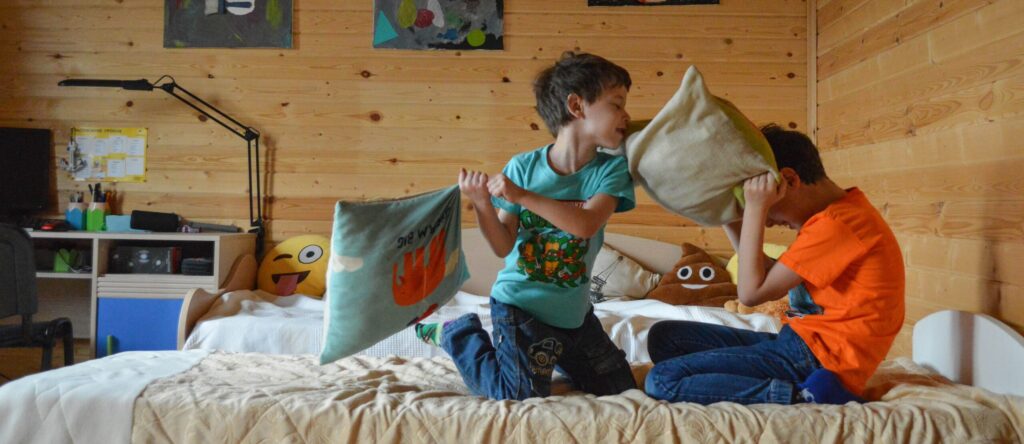Sibling relationships are often a casualty of the narcissistic mother. In fact, narcissistic mothers both consciously and subconsciously create sibling rivalry.
Why Do Siblings Compete Against One Another for a Narcissistic Mother’s Affection and Approval?
Due to the limited resources of affection, attention and favor from the narcissistic mom, siblings have to vie for their rations. Because narcissistic mothers are self-centered, they have precious little time and effort to spare for their children. Thus, any attention, whether it be positive or negative, may be pursued by the children of a narcissistic mother even at the expense of relating to their siblings.
What Do Normal Families Look Like vs Narcissistic Families?
In functional families, sibling rivalry naturally occurs. But, adequate parenting encourages respect between siblings as children mature. Siblings are encouraged to look to one another for company and support.
This isn’t the case in a family with a narcissistic parent. Children are pitted against one other and taught from very early on that if they wanted any sort of “love” or attention from their mother, they’ll must compete for it against each other.
If you grew up in a narcissistic family system, you may now see there’s a constant comparison between siblings—who’s doing better and who’s ranking higher in the narcissistic mother’s eyes. Because of this, you may not feel connected to your siblings. You may feel distrustful of them because you can’t be sure what you say won’t be held against you.
You may long to feel the camaraderie and closeness your friends have with their siblings.
Sadly, siblings with a narcissistic mother often sacrifice relationships with each other to compete for something that doesn’t exist: their mother’s unconditional love. Narcissists have difficulty feeling love or empathy for anyone, leaving you and your siblings to bid for conditional, short-term attention that can be switched on and off at any minute.
At times you may be frustrated with yourself for feeling unworthy and inadequate. You may project those self-deprecating feelings onto your siblings as well. You are taught from a young age to repress your feelings and that they don’t matter.
Children are often put into shifting roles by the narcissistic mother. First, the golden child, is the hero, the mother’s other-half, or her mirror. There are pros to this role, such as getting all of the best stuff, the attention, and the ability to entertain the illusion you can do no wrong. Your accomplishments, no matter how minor, are celebrated to the fullest extent. However, it is not all sunshine and rainbows for the golden child.
You may become enmeshed with your narcissistic mother and grow up without any real knowledge of boundaries or self-identity. In this spotlight, you are just the puppet of the mother, and the one of whom the other siblings are ultimately the most jealous.
Then there’s the scapegoat. When you receive attention from your mother in this role, it’s of the negative variety. But, oh, the relief in feeling you are at last beyond her control. Of course, that feeling can be short-lived as a child because the narcissistic mother will make great effort to strip you of that control and as the adult, she often has the power to do so.
When in the scapegoat role, you shoulder the blame, shame, and anger of the family. If something goes wrong, it’s your fault. You are labeled as the “bad” one, even if you don’t fit into that category. The silver lining of the scapegoat role is that you often have a better concept of self and independence than does the golden child, which can help you later on in life.
Finally, if you are the lost child, the forgotten one that receives neither the praise nor the blame, you may do your best to remain invisible and away from your mother’s wrath. You sense it might be better to go unnoticed than to have to deal with the emotionally debilitating games your narcissistic mother plays with her other children.
Some narcissistic mothers intentionally triangulate and pit their children against one another because of their belief in the “zero sum game.” This is a narcissistic game in which one participant’s gain results from the others loss.
The net change in total wealth of affection among participants is zero. The attention the children receive from their mother is shifted, not shared; always someone is left out. Therefore, a gain by one child is a loss for another.
The term “triangulate” means a game of three roles are being played. Imagine a triangle where at each one of three points there’s the villain, the victim, and the rescuer.
The villain is the one who blames, disrespects, attacks, or criticizes the victim. In turn, this tempts the rescuer to defend the victim, which can move the rescuer into the villain’s place and the villain into the victim’s place.
The roles often switch and reverse. For example, the narcissistic mother can start out as the villain and the scapegoat as her victim. If you try to become your sibling’s rescuer when your brother or sister is in the villain role, you, instead, become the villain in your mother’s eyes for betraying her. And, she in turn, is now the victim of you and tempts your sibling to become the rescuer to gain mother’s positive attention.
It is an exhausting emotional game that may never end.
She can also make active attempts to insure the competition is fierce. She may spend excessive time alone with one of her children, most likely the golden child, instead of including all of her children in an activity or outing.
She may commiserate with one child about the other’s negative behavior, so that a tag-team competition is set up as well. Some narcissistic mothers intentionally block bonding and encourage competition between siblings. Other narcissistic moms creative a vacuum of neglect where the kids are left to prey upon each other for the meager emotional resources that are available in the family environment.
Families like this can feel like an emotional desert. The result of tactics like emotional abuse, lies, and neglect, however, ensures her children are always on their toes, working to earn her conditional love.
Negative Feelings Toward and From Your Sibling Can Continue Into Adulthood
The negative feelings you had toward your siblings while growing up can carry on well into your adult life. Siblings may never be close to each other due to the deep emotional scars and animosity they were programmed to feel towards each other by the narcissistic family environment. You may find one of your siblings is unable to let go of the old system and actively keeps the rivalry going. He or she will then miss the value of having a fellow survivor, their brother or sister, who understands what they endured.
You Can Work to Decrease Competitiveness Between Your Siblings, But Give Yourself Grace if Your Sibling Isn’t Ready
As adult children of narcissists (ACONs), competition between your siblings can decrease if there’s a realization by all parties that what you were taught growing up is not how siblings need act towards each other. Instead, it’s possible to support and ally against the narcissistic mother’s negative behavior. There is sometimes an opportunity to create trust and bonding between adult siblings of narcissists that was not possible as children caught in the destructive narcissistic pattern of parenting.


